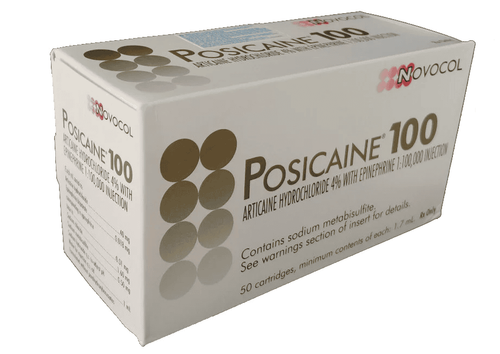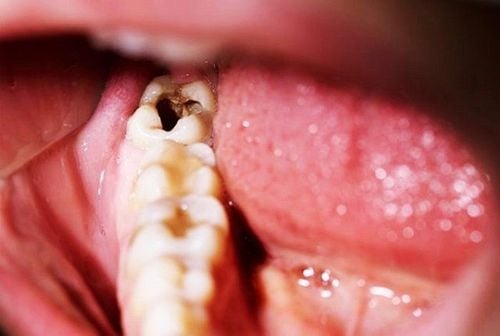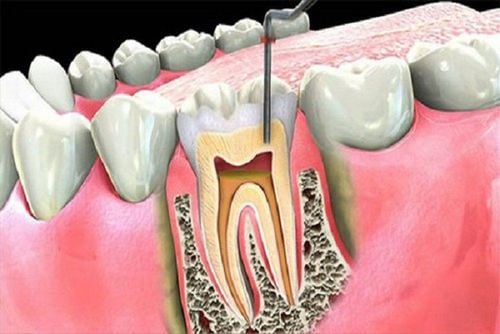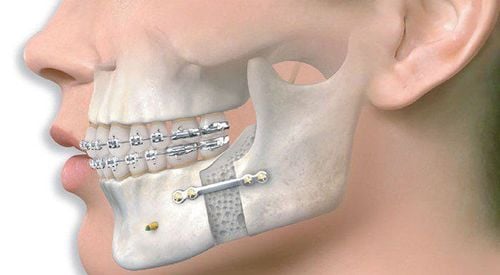This is an automatically translated article.
Cavities are common in posterior teeth due to their difficulty in cleaning and their grooved surface structure. However, the anterior incisors are still at risk of decay. The decay of the front teeth will bring a lot of trouble, especially in terms of aesthetics. So if you or your baby has tooth decay, what should you do to solve this problem?
1. Causes of tooth decay in front teeth
Incisor caries is a tooth lesion with the formation of one or more holes in the front teeth, initially small in size but will grow larger if left untreated.
The cause of tooth decay is due to the activity of certain species of bacteria that can live in the plaque on the teeth. Bacteria in plaque can convert sugars in food into acids. If plaque is allowed to build up over time, these acids can start to damage your teeth.
This is why good oral hygiene is an important part of preventing tooth decay in general and caries in particular.
Everyone is at risk for tooth decay, but some people are at higher risk. These factors are such as:
Eating too many sugary or acidic foods or drinks; Poor oral hygiene habits, such as not brushing or flossing daily; Not getting enough fluoride; Dry mouth; Eating disorders (such as anorexia or bulimia); Acid reflux disease, the reflux of stomach acid can erode tooth enamel.
2. Signs and symptoms of incisors caries
Symptoms of incisor caries will depend on how big the cavity is, there may not be any symptoms at first, but as the cavity gets bigger the symptoms can get worse.
Signs of tooth decay include:
Pain or soreness in the incisor area that occurs without warning; Sensitive teeth ; Pain when you eat or drink sweet, hot or cold things; Holes or pits in the front teeth; Black, white or brown stains on front teeth; Pain when biting down.
3. Cavity front teeth what to do?
It is necessary to detect and treat incisor caries as soon as possible before this condition becomes serious. This can be especially important for children with front tooth decay because they may have many other cavities with them.
In order to be diagnosed with early tooth decay, you should have regular dental check-ups, the period of regular dental check-ups will be decided by your dentist depending on your oral condition and overall health.
While waiting for your next dental visit, the symptoms of tooth decay may bother you, ask your doctor about using an over-the-counter pain reliever, or you can also:
Brush your teeth with warm water; Choose a toothpaste for sensitive teeth; Avoid foods and drinks that are too hot, cold, or sweet. To treat caries in the front teeth, usually, doctors will remove the decayed part of the tooth first to avoid the pathogen spreading through the remaining healthy teeth.
The deep curettage technique requires thorough removal of the deep wound and must not violate the healthy tissue. But with incisors, due to their slender shape, the enamel at the edge of the teeth is thin, leading to the loss of too much real tooth tissue. This makes it difficult to restore and aesthetic after treatment.
Subsequent treatment depends on the extent of the damage to the front teeth, options may include:
Fillings : When the cavities are small or located on the inside of the front teeth, the doctor will fill the hole. with a tooth-colored material such as a composite resin. Veneers (Crowns): When a tooth is so badly decayed that there isn't much healthy enamel left, your doctor may advise you to choose this method. After the damaged part is removed and repaired, a crown is placed over the remaining tooth. Root canal treatment: If the root or pulp is dead or damaged beyond repair, you may need a root canal. The doctor removes nerves, blood vessels, and tissue along with decayed parts of the tooth, and then fills the canals with suitable sealing material. Finally, a crown to cover the filled tooth may be needed.
4. Prevention of dental caries
To prevent tooth decay, you should:
Brush your teeth at least twice a day with a toothpaste that contains fluoride. Preferably after meals and before going to bed. Clean between your teeth daily with floss or an interdental cleaner. Gargle daily with a fluoride mouthwash. Some mouthwashes also have antiseptic ingredients to help kill the bacteria that cause plaque. Eat well-balanced meals and limit snacking. Avoid foods that contain carbohydrates such as cookies, candy, and chips, as these can stay on the surface of your teeth. Drink at least one liter of fluoridated water a day to prevent your baby from developing tooth decay. Periodic dental check-ups to be checked and cleaned of plaque. Cavities in front teeth can affect your oral health, your overall health, chewing problems, and your or your baby's aesthetics. The treatment of incisor caries is quite difficult if the damage is more. Therefore, it is necessary to prevent the disease when the disease has not occurred and try to detect it early so that the treatment effectiveness is highest.
Please dial HOTLINE for more information or register for an appointment HERE. Download MyVinmec app to make appointments faster and to manage your bookings easily.













